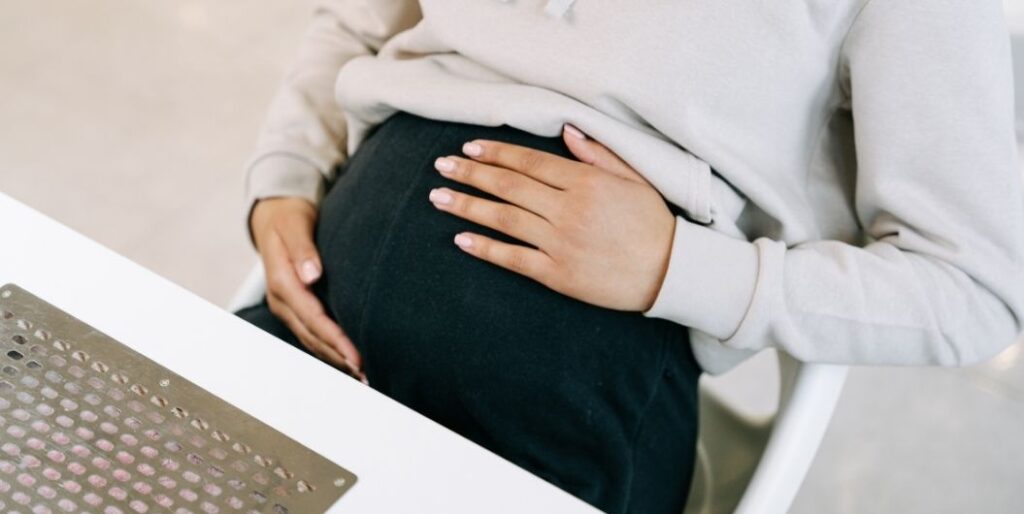The Complaint Department

Morning Sickness. Morning sickness is one of the most bothersome pregnancy-related complaints, but also one of the most common: studies have shown that 80% of pregnant women experience it to a certain degree. The best ways to do battle with morning sickness are to keep your blood sugar level relatively stable by eating frequently throughout the day; avoid fluids at mealtimes, since this may add to your nausea; focus on eating stomach-friendly foods; steer clear of strong odors; and avoid tight-fitting clothing. If all else fails, try wearing a set of anti-nausea wristbands: some pregnant swear by them.
Fatigue. Fatigue is Mother Nature’s way of reminding you that you need to slow down. After all, your body is busy growing a baby. Your energy level will pick up during the second trimester, but you can expect to feel pretty dragged out until that time. The best way to cope is to give your body what it needs: plenty of sleep.
Breast tenderness. You may find your breast feel sore and swollen around the time that the pregnancy test comes back positive, particularly if you’re pregnant for the first time. Fortunately, this extreme tenderness tends to ease up relatively quickly. In the meantime, you might want to put your partner on notice that there’s a hands-off policy in effect.

Constipation. High levels of progesterone cause the muscles of the intestine to get a little sluggish when you’re pregnant — something that can lead to the misery that is constipation. Fortunately, the problem takes care of itself if you drink plenty of water, consume large quantities of high-fiber foods, and exercise regularly.
Hemorrhoids. Hemorrhoids occur when pressure from the baby’s head causes the veins around the anus to swell. You can minimize the discomfort by applying an ice pack or prescription ointment to the affected area; keeping the area around your anus clean; not straining when you’re having bowel a movement; and not sitting on hard surfaces or standing for long periods of time, but chances are your hemorrhoids won’t disappear entirely until long after delivery day.
Backache. Wondering why your back is feeling so sore? The overstretching of your abdominal muscles, chances to your posture and the curvature of your spine, and the hormonal changes that cause the ligaments in your back to relax are all to blame. Your best bets for minimizing your discomfort are to avoid activities like running that may be jarring to your spine; exercise caution when you’re bending, lifting, or otherwise changing position; avoid sitting or standing in one position for long periods of time; pay attention to your posture; and tuck a pillow between your knees when you’re sleeping on your side.
Heartburn. The hormonal changes of pregnancy are responsible for yet another common complaint: heartburn. Your best best for battling heartburn are to eat smaller, more frequent meals; avoid spicy or fried foods; coat your stomach with a glass of milk before eating; and skip your bedtime snack. If all else fails, you might want to ask your doctor or midwife to recommend an antacid or medication that’s safe for use during pregnancy.

Breathlessness. It’s hardly surprising that you find yourself feeling out of breath each time you climb a flight of stairs: you’re subletting your lungs to your uterus! This is why that bothersome feeling of breathlessness tends to get worse as your pregnancy progresses. By the time you go into labor, you may find yourself imitating Jerry Lee Lewis and singing, “Oh baby, you leave me breathless!” There’s not much you can do about this particular complaint but count down the days until you deliver – something that will have you breathing easier for more than one reason.
Insomnia. Whether it’s caused by anxiety about the coming birth or the physical discomforts of pregnancy, insomnia is a common complaint during pregnancy. Try exercising regularly; winding down with a mug of warm milk; skipping your late-evening snack; and sleeping with as many pillow as it takes to make yourself comfortable.
Braxton Hicks contractions. Braxton Hicks contractions are the irregular contractions that occur during the last half of pregnancy as your body starts to do some heavy-duty training for the main event (labor!) While they can be very uncomfortable and sometimes even painful, there’s not much you can do about them except practice your labor breathing and remind yourself that pregnancy is a limited-time offer: you won’t be pregnant forever, even though it may sometimes feel that way.
